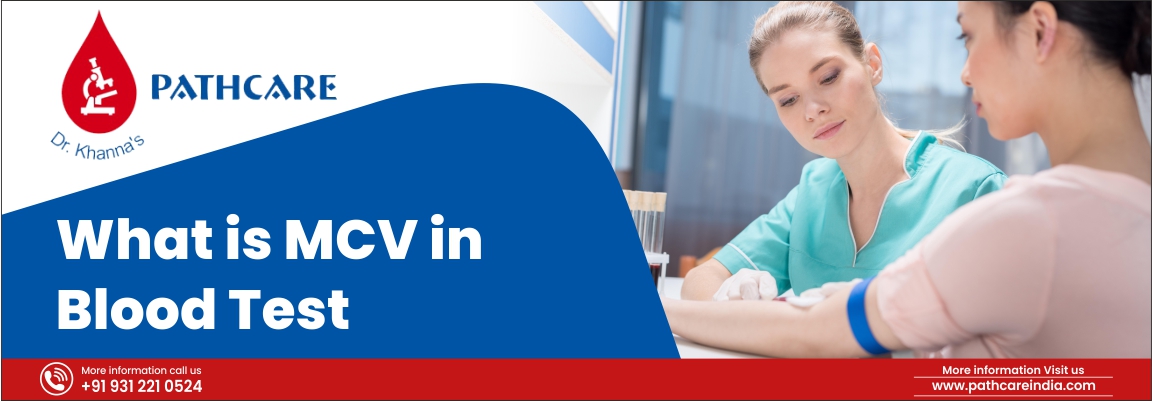No products in the cart.

The size of your red blood cells, which carry oxygen throughout your body, is measured by a mean corpuscular volume (MCV) blood test. The MCV count, also known as mean cell volume, is vital in a complete blood count (CBC). MCV levels may be high, indicating that red blood cells are abnormally big, or low, indicating that red blood cells are smaller than average. High MCV levels may indicate liver illness or a vitamin shortage, whereas low MCV levels are frequently associated with iron deficiency anemia.
This article describes how an MCV blood test in Delhi is performed and what high and low levels in your findings may indicate. You can also book an MCV blood test in Delhi from Pathcare labs for quick and reliable results.
What exactly is an MCV blood test?
MCV (mean corpuscular volume) is a measurement calculated during a normal blood test known as a complete blood count (CBC). The MCV test determines the standard size of your red blood cells. Red blood cells work to carry oxygen throughout the human body. This oxygen, consequently, provides energy to your cells. The properties of your red blood cells, including size, indicate how efficiently they transport oxygen.
An MCV blood test is helpful because having an unusually big or small amount of red blood cells can suggest certain disorders. It is less useful if a blood sample contains a wide range of red blood cell sizes. Even if there is an irregularity, the data could average out as normal.
On all CBCs, an MCV is regularly conducted by an automated system. It is included in the section of the CBC known as the RBC (red blood cell) indices, which provides information about your red blood cells in particular.
The following measurements are included in RBC indices:
MCV (mean corpuscular volume): The size of your red blood cells on average.
MCH (mean corpuscular hemoglobin): The amount of hemoglobin in your red blood cells on average. Haemoglobin is a protein that permits red blood cells to transport oxygen.
Mean corpuscular hemoglobin concentration (MCHC): what is the typical hemoglobin concentration in the RBCs?
Red cell distribution width (RDW): The size variation of your red blood cells.
An MCV does not provide enough information to make a diagnosis. An MCV blood test in Delhi, when combined with these other tests, can help your provider understand more about the health of your red blood cells and diagnose issues.
Why do doctors check MCV levels?
A doctor will usually check someone’s MCV levels if they have:
- Lips that are dry and cracked
- Cold sensitivity
- Fatigue
- Bruising or bleeding readily
- Unexplained weight loss
- Cold hands and feet
- A complexion that appears paler than typical
- Jaundice
These symptoms reflect disorders that cause red blood cells to be smaller or larger than usual.
Microcytic anemia occurs when red blood cells are smaller than expected. A person may have macrocytic anemia if they are larger.
Testing Details
An MCV is performed on a blood sample taken from a vein. If you are in the hospital and have a port in your vein, it may be drawn from the port in your arm instead.
The area will be cleaned first by a lab technician or phlebotomist. The tourniquet will then be applied to your arm. They will place the needle into your vein after they have located it.
You will feel a sharp poke as the needle is put into the vein. Furthermore, you may feel pressure while the sample is being obtained.
When the test is finished, the phlebotomist will remove the needle and apply pressure to the puncture wound until the bleeding stops. The bandage or gauze wrap will next be applied.
After collecting a blood sample from your arm, the healthcare provider will send it to a lab for analysis. A different provider will examine your blood sample using a microscope to collect information about your blood cells, such as the average size of your red blood cells.
What is a normal MCV level?
An average adult MCV level is 80–100 femtoliters (fl). However, the normal ranges may vary between age groups and sexes.
|
Age |
Male |
Female |
|
1-19 |
81.9 – 87.3 fl |
82.4 – 87.3 fl |
|
20+ |
89.8 – 93.6 fl |
90 – 92.5 fl |
Children between ages 6–12 years normally have an MCV range of 86 fl.
MCV results may differ between labs, so people should not be concerned if their level is slightly above or below these ranges.
Low MCV level
When a person’s MCV level falls below 80 fl, it indicates microcytic anemia. Microcytic anemia is a kind of anemia characterized by smaller-than-normal red blood cells.
Microcytic anemia is caused by an iron shortage. Iron deficiency is frequently caused by an underlying health issue or by variables such as food and drugs.
Common reasons for iron deficiency include:
Blood Loss: When a person has colon cancer or takes nonsteroidal anti-inflammatory medicines (NSAIDs) such as aspirin, they may develop bleeding from the gastrointestinal (GI) tract. People who have heavy periods may lose a great deal of iron through their menstrual blood.
Diet: If someone consumes a low-iron plant-based or omnivorous diet, they might have to consume iron supplements or emphasize eating iron-rich foods.
Reduced iron absorption: Iron absorption may be reduced by ulcerative colitis, Crohn’s illness, weight loss surgery, and Helicobacter pylori infection.
Pregnancy: People may need to augment their iron intake during pregnancy since the body requires additional iron to support fetal growth.
Thalassemia
Thalassemia is a condition in which the body fails to produce enough normal hemoglobin. It is a hereditary disorder inherited from one’s parents.
Thalassemia can be minor to severe. A person with mild thalassemia may have mild anemia or not exhibit any signs or symptoms. Someone having severe thalassemia may need regular red blood cell transfusions.
High MCV level
When a person has a high MCV level, their red blood cells are larger than normal, resulting in macrocytic anemia. Macrocytosis develops when the MCV level exceeds 100 fl
Megaloblastic anemia is a kind of macrocytic anemia. The most prevalent causes of megaloblastic anemia are cobalamin (vitamin B12) and folate (vitamin B9) deficiencies.
Food and autoimmune factors
The following reasons can cause vitamin B12 insufficiency.
Vegan diet: A vegan diet may result in vitamin B12 deficiency. This is due to the fact that vitamin B12 is naturally found in animal sources. To ease symptoms, a person could use vitamin B12 supplements or eat vitamin B12-fortified foods.
Gastritis due to autoimmunity: This is an inflammatory disorder affecting the stomach, namely the parietal cells that produce intrinsic factors. Vitamin B12 cannot enter the bloodstream through the distal small intestine if the parietal cells do not produce adequate intrinsic factors. Vitamin B12 injections and, in some cases, iron infusions are used to address the shortage.
Other reasons
Other causes that could cause vitamin B12 and B9 deficiency include:
- excessive alcohol consumption
- breast-feeding
- tapeworm
- Cancer treatment medications
- Crohn’s disease
Takeaway
The CBC test offers information about your blood, including the structure and count of red blood cells. Because it frequently includes the MCV test, it’s important to understand the results and what having high MCV levels implies for your health. If you have raised MCV in your blood test, extra lab tests, such as an iron panel blood test and a vitamin B12 blood test, can be conducted to detect anemia.
Book your blood test in Delhi now with Pathcare Labs. The initial stage in disease diagnosis is the administration of diagnostic tests. Thus, the efficiency and precision of laboratory tests are critical for every individual in order to make an accurate disease diagnosis.
Pathcare labs value your trust, and patient comfort is the driving force behind their skilled team of technicians. Pathcare labs have been serving millions of patients in the last 18 years, and the number keeps growing.
They provide affordable health tests with reliable results that are accessible to all with a perfect blend of technology and skill.
Frequently Asked Questions
How can I have my MCV level checked?
MCV levels are measured as part of a complete blood count (CBC). The CBC test is a simple blood test that may be readily scheduled at Pathcare Labs by calling our pathology department or booking the test online via our official website. Our phlebotomist will collect your blood sample for free at your location.
What does a high MCV level in a blood test mean?
A blood test with a high mean corpuscular volume (MCV) suggests that red blood cells are larger than average. Macrocytosis refers to the presence of big blood cells.
How should I prepare for the testing?
An MCV is a value determined by an automated blood counter based on the number of red blood cells in a given volume of blood. It is performed as part of a standard CBC and requires no extra preparation.
How long does it take for MCV to recover?
The underlying cause of high or low MCV levels will influence when or whether they can return to normal. It takes roughly a month to treat a vitamin B12 deficit. If it is caused by alcohol, it returns to normal when the person stops drinking. Your healthcare practitioner can advise you on what to expect.




